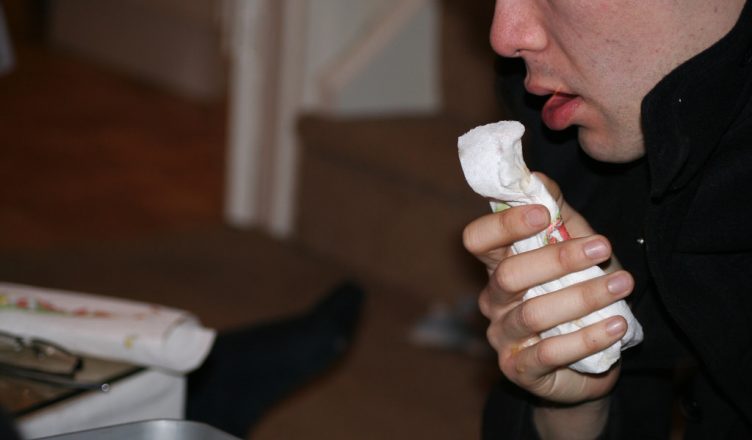Last week, the husband of a friend of mine had an abdominal pain and vomited a lot one morning. It was watery at first then the fluid content was yellowish and had an unpleasant odor. She was so worried that she called me for advice. It was most likely that her spouse had been vomiting bile and I suggested that he should go to a clinic for a further examination. You need to be cautious of this situation because it might indicate underlying conditions.
What is bile?
Bile is the green-yellowish digestive fluid produced by the liver and transferred to the gallbladder. The primary function of the bile is to break down fat in the small intestine. Your body thereby could absorb these nutrients and other oil soluble vitamins.
Besides the major role in the digestion process, the bile salt is also the way to excrete bilirubin, the harmful byproduct from the blood regeneration process. Bilirubin is the substance responsible for the yellowish color of bile.
The reasons for throwing up bile
Abdominal pain and vomiting of bile have a variety of causes, which include:
- Food poisoning
- Severe vomiting that exceeds your stomach’s volume
- Enormous alcohol consumption
- Intestinal blockage
However, if the condition of throwing up bile recurs more than once, it is possible that the patient is suffering from bile reflux.
What is the bile reflux disease?
In the bile reflux disease, the digestive secretions in the small intestine (particularly the duodenum) flow back to the upper gastrointestinal tract. The cause of this phenomenon is due to the incompetence of the pyloric sphincter and the cardiac sphincter. These smooth muscles function as the valves of the stomach to ensure that the chyme (semi-fluid digested food) flows one way.
The malfunction of the cardiac sphincter and the pyloric sphincter might be the result of these causes:
- Due to complications after Gastrectomy (partial or complete removal of the stomach)
- Due to the gallbladder surgery
- Due to duodenal ulcer, which correlates closely with GERD – Gastroesophageal reflux disease. The bile reflux disease is also common in patients who suffer from chronic GERD. It is not that common, but there are cases of bile or acid reflux in newborn babies.
What are the typical symptoms of the bile reflux disease?
First, you need to distinguish gallbladder reflux disease with gastric reflux. These are two completely different diseases, but they usually accompany each other. Significant signs and symptoms are listed below:
- Hot belching and bitterness in the mouth: this is the most typical symptom of the disease. The cause is the reflux of bile and gastric fluid back to the esophagus, which gives it the bitter taste.
- Discomfort symptoms such as abdominal pain, rash, and heartburn are also common.
- Continuous nausea and throwing up bile
- Throat soreness, hoarseness, and laryngitis because of the damage to the larynx mucosa by the reflux of the digestive secretion
- The patient is pallid and loses weight.
How dangerous is the bile reflux disease?
Bile or gastroesophageal reflux is a chronic condition that should you should not underestimate. At first, the disease causes discomfort for patients whenever the phenomenon of reflux occurs.
Illness if not treated in time will lead to dangerous complications such as gastric ulcer, esophageal cancer, and especially stomach cancer.Therefore, when the signs of the disease are noticeable, the patient should quickly see the doctor to get the right diagnosis.
What are the solutions for throwing up bile condition?
1) Medical treatment
Treatment of bile reflux is not as easy as controlling gastric acid reflux by only the change in diet or lifestyle. The bile reflux disease usually requires medication. Usually, drugs that can inhibit the secretion of gastric acid are also effective for bile reflux. Moreover, bile sequestrant drugs, which reduce the level of lipid in blood, are also common for patients with bile reflux disease.
If the patients still suffer throwing up bile for a prolonged time, doctors will consider changing your prescription. For some severe cases, your test results might indicate the pre-cancerous signs in the esophagus or stomach. In that situation, surgical options will be considered:
- Gastric bypass surgery (Roux-en-Y): The surgeon creates a bile duct inside the small intestine to deliver bile from the stomach.
- Anti-reflux surgery: This method is to strengthen the valve and can reduce the reflux of gastric esophagus.
2) Taking preventive measures
For patients with bile reflux or acid reflux, lifestyle changes are necessary.
- Patients often identify for themselves what specific foods cause reflux symptoms and know how to avoid it. However, unnecessary advice on diet often leads to noncooperation. Foods that often cause reflux include food that is high in fat and spices. Some drinks may increase symptoms including cola, dark coffee, tomato juice and orange juice.
- Avoid late meals and binge eating
- Do not wear too-tight clothes after meals.
- Take a walk after eating: After eating, it takes 2-3 hours to empty the stomach before lying down.
- Alcohol restriction: Excessive drinking can increase symptoms so do not drink too much. Low pH drinks like red wine can increase symptoms. Moderate drinking is acceptable in most cases.
- Smoking cessation: Nicotine in the tobacco reduces the production of the saliva. The oral dehydration will exacerbate the irritation.
- Meditation: Long-term stress will make the stomach release more damaging factors (hydrochloric acid, pepsin) compared to the protective factors (mucus), which compromises the mucosa layer of the gastrointestinal tract. Relaxing will help your body adjust the production of both factors.
- Keep your head higher than the chest level while lying: Elevation of your head can reduce the reflux symptoms. The gravitation will prevent you from throwing up bile.
Reference
- https://www.ncbi.nlm.nih.gov/pmc/articles/PMC3745208/
- http://www.mayoclinic.org/diseases-conditions/bile-reflux/basics/definition/con-20025548

